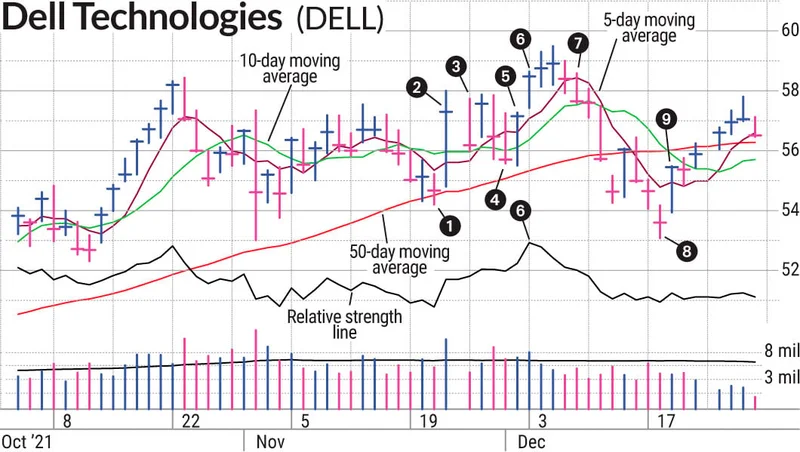So, Dell is the new Wall Street darling. The stock is on a tear, up something like 34% in a month, and everyone with a microphone is screaming "AI! AI! AI!" until they’re blue in the face. It feels like we’re back in 1999, just with different buzzwords.
I can just picture the conference call. Some VP in a crisp, never-worn shirt, sitting in a sterile room in Texas, reading from a script about "synergies" and "transformative periods." Michael Dell himself is comparing this moment to the early internet. Give me a break. Every time a tech company needs to juice its stock price, they pull out the "next internet" card. It’s the oldest trick in the book, and yet, here we are, watching the market gobble it up like free pizza in the breakroom.
The company jacked up its long-term forecast, now targeting 7-9% annual revenue growth and a whopping 15% jump in earnings per share. Why? Because they’re selling the picks and shovels in the great AI gold rush. Specifically, they're selling AI-optimized servers packed with Nvidia chips to companies like Elon Musk's xAI. It's a brilliant move, offcourse. You don't have to win the gold rush yourself if you can sell overpriced equipment to every desperate prospector who comes along.
But does this sudden explosion of optimism actually hold water, or is it just hot air designed to keep a legacy hardware company relevant?
The Two-Faced Pep Rally on Wall Street
Here’s where it gets interesting. You’ve got the big banks—BofA, Morgan Stanley, JPMorgan—all tripping over themselves to raise their price targets. They see the headline numbers, hear the AI siren song, and their Pavlovian response is to tell everyone to BUY. They’re pointing to a "PC refresh cycle" and the glorious, unending demand for AI infrastructure, a sentiment echoed in reports that DELL Stock Surges as Wall Street Lifts Price Targets on AI-Fueled Long-Term Growth Goals.
This is the part of the show where the hype machine is running at full blast. It’s a self-fulfilling prophecy: analysts say the stock will go up, so people buy it, and it goes up. Simple. No, 'simple' doesn't cover it—this is a feedback loop built on pure, uncut speculation.

But if you listen closely, you can hear the whispers in the background. TD Cowen’s analyst, Krish Sankar, basically put a "Hold" on the stock while muttering concerns about whether companies will actually adopt these expensive servers at the pace Dell is promising. He pointed out that Dell’s operating margin seems stuck in neutral. Then there’s JPMorgan's own analyst, Samik Chatterjee, who called Dell’s margin promises a "show-me" story. That’s Wall Street code for, "Yeah, nice PowerPoint, guys. Call us when you actually do it."
This is the real story. The public-facing narrative is a rocket ship to the moon, but the private analysis is riddled with doubt. They’re worried the high cost of making these fancy AI servers will chew up the profits. They’re skeptical that this PC refresh cycle is any different from the last five boring ones. But who wants to be the guy who misses out on the next big thing? So they slap a "Moderate Buy" consensus on it, which is the financial world’s way of shrugging its shoulders and saying, “Hell if I know.”
A Mountain of Iron and a Question of Margins
Let’s be brutally honest for a second. Dell isn't an AI company. Dell is a box-moving company. They assemble components made by other, more innovative companies (hello, Nvidia) and sell them at a markup. Their entire business model is a tightrope walk of supply chain management and profit margins.
The central metaphor here isn't a gold rush; it's a high-stakes catering business. Dell is promising to serve a five-star meal (AI infrastructure) to the entire world. But the price of the main ingredient—the Nvidia GPUs—is astronomical and controlled by a single supplier. Dell can sell a ton of these server "meals," but if the cost of the ingredients keeps rising, their profit per plate shrinks to nothing. They’re making $20 billion in two years from this AI business, which sounds great, but what’s the margin on that $20 billion? They don’t seem too eager to break that down for us, do they?
This whole thing feels incredibly fragile. It hinges on the idea that thousands of companies, not just a few tech giants, will suddenly decide they need to spend millions on Dell servers to run AI workloads they haven't even fully defined yet. Are we really supposed to believe that every mid-sized insurance company in Ohio is about to drop a fortune on an AI server farm? Or is this demand being driven by a handful of huge clients, a demand that could dry up the second a cheaper or better option comes along?
And what happens when the AI hype cycle inevitably cools down? Because it will. Every tech trend does. We’re left with a company that bet the farm on selling premium hardware for a gold rush that might just be a flash in the pan. Then again, maybe I'm the crazy one for doubting a 34% stock surge... but something about this just smells funny. It smells like desperation wrapped in opportunity.
Yeah, I've Seen This Movie Before
Look, I get it. The market loves a good story, and "Dell, the AI King" is a hell of a story. It's a comeback narrative for a company most people associate with beige desktop towers from 2005. But when you strip away the buzzwords, you're left with a hardware reseller riding a massive, speculative wave. They’re not creating the wave; they’re just surfing it. And we all know what happens when the wave breaks. For now, they're printing money. But this feels less like a sustainable new era and more like a fantastic trade that will eventually punish anyone who overstays their welcome.
